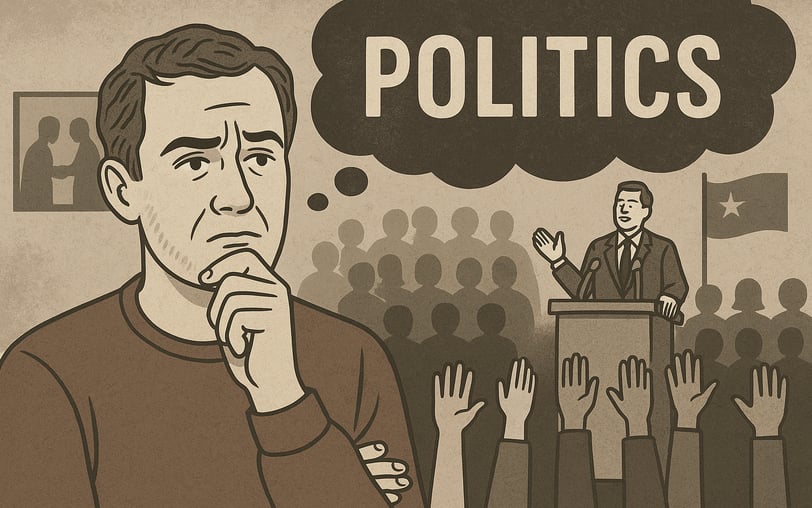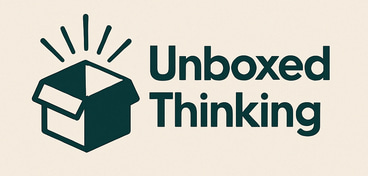I Want to Believe — But Politics Makes It Hard
Raised in a worldview that saw politics as a dead-end, I’ve carried that skepticism into adulthood — even as I long to believe in meaningful change. In this first post, I unpack my cautious relationship with political systems, the charisma-over-substance trap, and what it might take for someone like me to trust the process.
Oliver
4/16/20253 min read


I want to believe that people in positions of power want to do good. Truly. I’ve met enough passionate, engaged, socially conscious individuals — some of them in politics — to know that good intentions are not in short supply. And yet… when I look at politics, especially at scale, I find myself hesitating. Flinching, even.
There’s a particular caution I carry, shaped partly by my upbringing. I was raised to believe that staying politically neutral wasn’t just wise, it was righteous. Voting? Off-limits. Running for office? Unthinkable. Political protests? Spiritually risky. According to the worldview I was steeped in, human governments were inherently incapable of fixing the world’s problems. Trusting them was like trusting a sinking ship to carry you to safety. (More on that in this piece I wrote about the Watchtower's version of “neutrality.”)
While I no longer subscribe to that rigid dogma, it left a mark. And maybe, just maybe, not all of its skepticism was entirely misplaced.
Because here’s the thing: politics is full of paradoxes. I believe many people go into politics with a genuine desire to serve. But the higher they climb, the more distorted things can get. Popularity becomes a currency. Fundraising overshadows ideals. Power consolidates, and with it comes temptation — the temptation to compromise, to self-preserve, to serve something other than the public.
And then there’s the elephant in the room: politics often feels like a popularity contest. The more charismatic you are, the smoother your delivery, the greater your chances. Sometimes it seems like elections are won not on policy or expertise, but on who looks the part. On who can deliver the best soundbite. On who comes off more like a celebrity than a civil servant. Sure, being a compelling orator is valuable. But smooth talk doesn’t fix healthcare. It doesn’t reform education. It doesn’t stop climate collapse or systemic inequality. Substance often takes a backseat to style — and that’s unsettling.
So what is it, really? Are politicians out to help their communities, or are they playing a rigged game where the winners mostly look out for themselves?
Then there’s the deeper structural stuff. Our systems of governance are built around elections — contest-style decisions with often razor-thin margins. One group wins; the others feel silenced. Half the country celebrates, while the other half braces itself. That’s not unity. That’s a tug-of-war.
In theory, a strong opposition should help balance things out. In practice? In many places, the opposition is just that: a group that opposes, blocks, criticizes — but can’t do much else. Collaboration often seems less valued than domination.
And what about the people? Protests flare up all the time. Sometimes they spark real change. Often, they fizzle out with little more than headlines and hashtags. The more cynical part of me — again, probably a trace of that religious conditioning — wonders: are we just moving furniture on a sinking ship?
And yet—despite all this—I still want to believe. I want to believe that politics can be a tool for progress. That we can vote for better, fairer, more compassionate outcomes. That real change is possible.
But even as I prepare to vote for the first time, I can’t shake the worry that I’ll be backing someone who just seems like the right choice—only to watch them later get caught up in the same kind of scandal, corruption, or backpedaling that has plagued so many before. It's hard to trust the polished image we’re sold during campaigns, knowing how often it ends up being just that: an image.
I'm 48 years old, and I’ve never voted in an election. Not once. But that’s about to change. With Canada’s next federal election on the horizon, I’ve made the decision to participate — finally. Even if my one vote feels like a drop in the ocean, I want to contribute. I want to show up.
To me, elections are like job interviews on a national scale. We’re hiring someone to represent us, advocate for us, manage our shared resources, and shape the systems we live under. The question is: are we, the people, good recruiters? Do we have the tools, the information, the discernment to hire wisely — or are we just going with the candidate who looked the part and said the right things in the final round?
I don’t claim to have the answers. But I do think it’s worth unboxing these questions — especially if, like me, your default setting was always “stay out of it.” Maybe the path forward starts not with blind faith in the system or total rejection of it — but with cautious curiosity.
